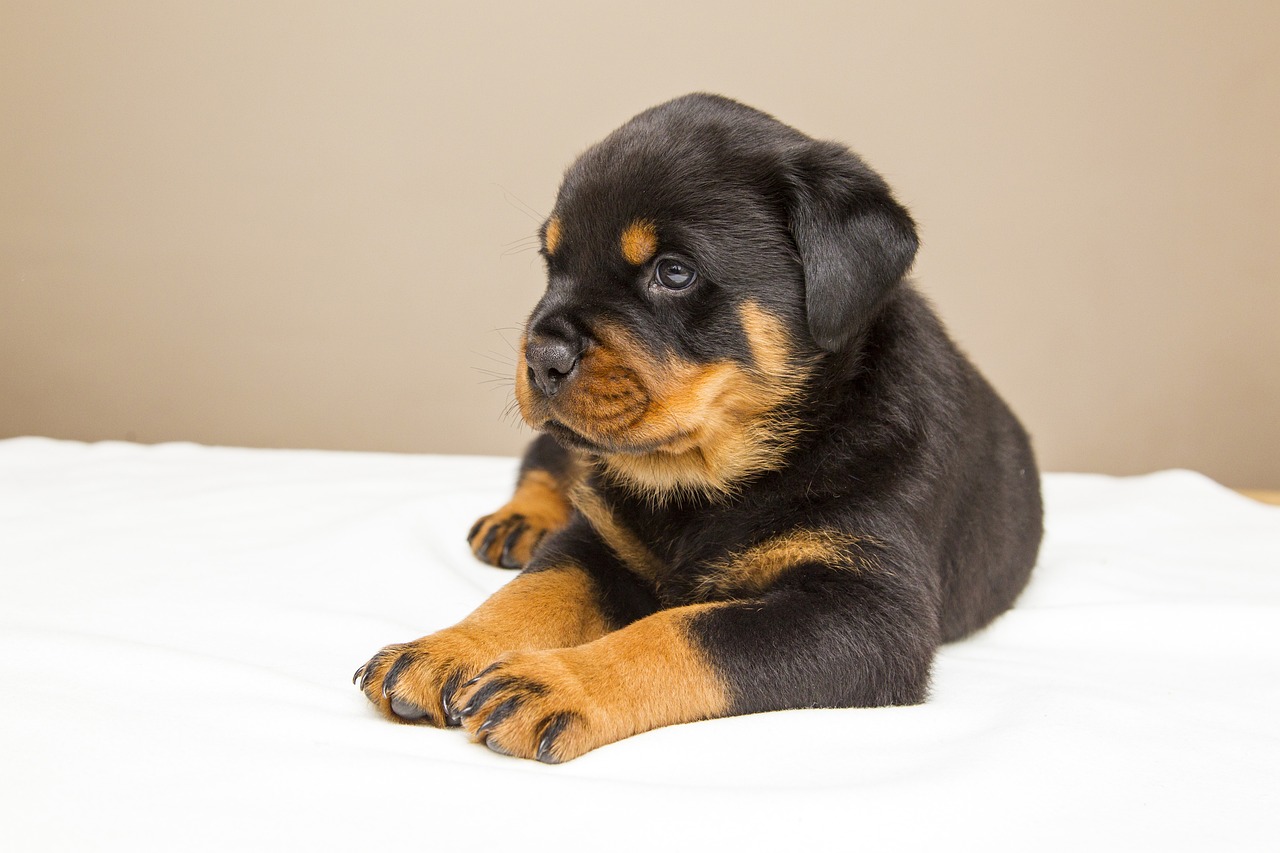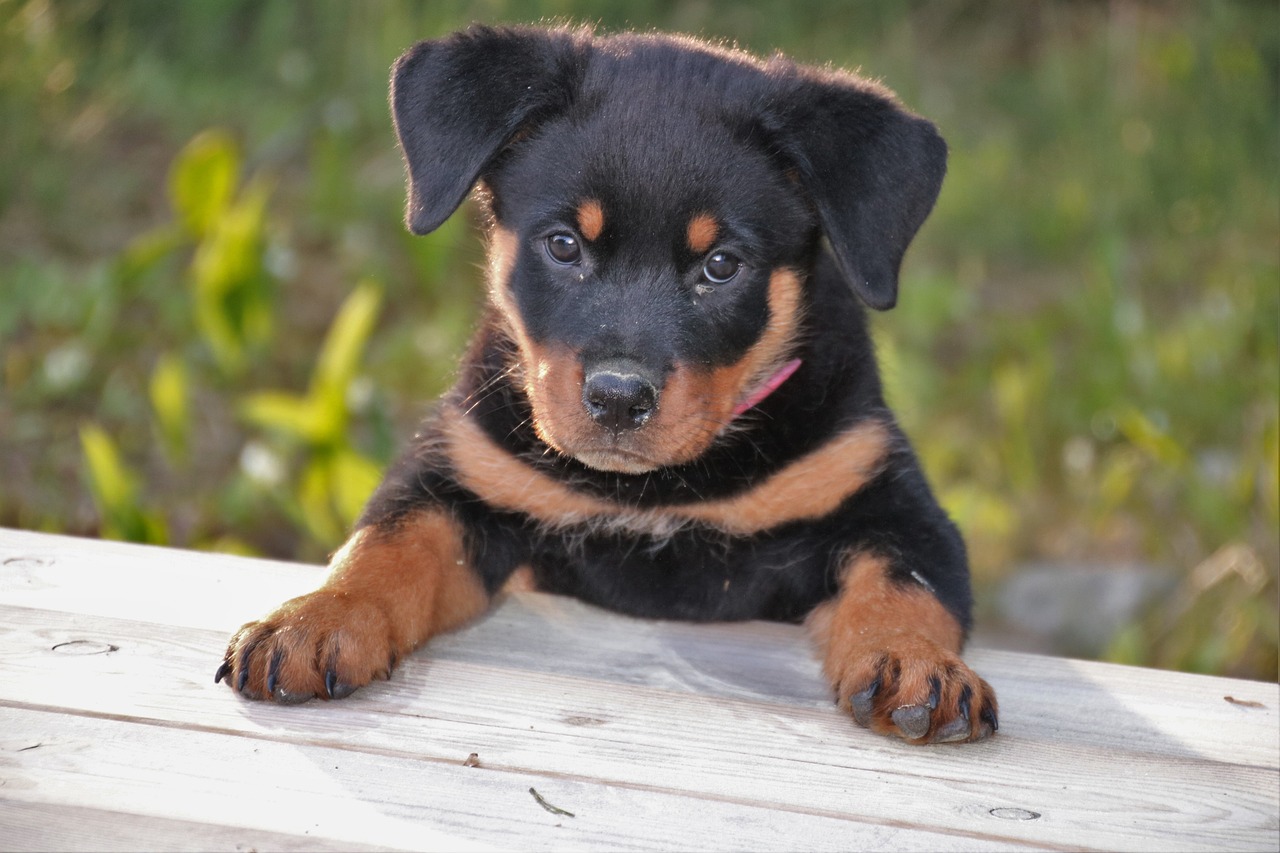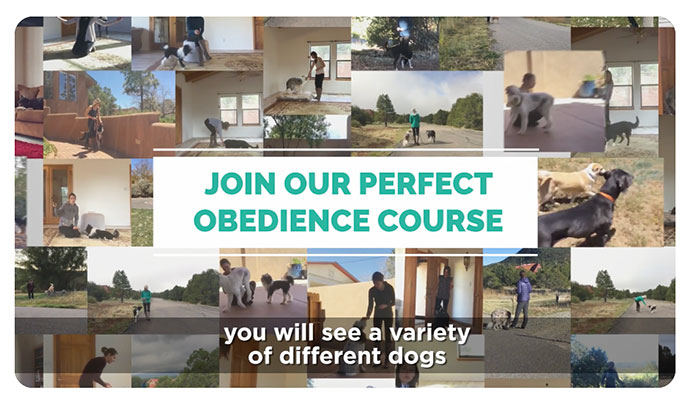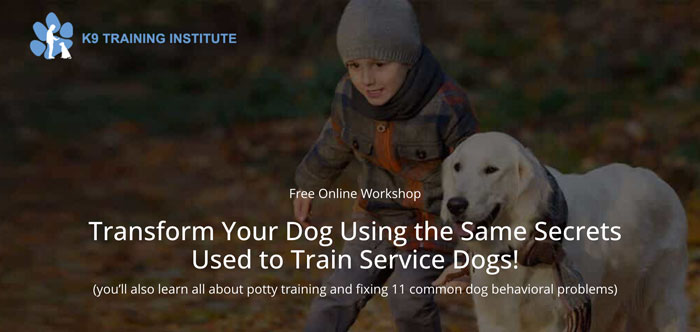Rottweilers are strong, loyal, and often protective dogs. Proper socialization from a young age is crucial for ensuring that they grow into well-adjusted adults.
The Right Ways to Socialize a Rottweiler Puppy
 Here are some expert recommendations on how to socialize a Rottweiler puppy effectively:
Here are some expert recommendations on how to socialize a Rottweiler puppy effectively:
1. Start Early:
- Begin the socialization process between 3 and 14 weeks of age, as this is the crucial window where the Rottweiler puppy is most receptive to new experiences.
2. Introduce to Various People:
- Expose the Rottweiler puppy to people of all ages, sizes, and ethnic backgrounds to ensure they’re comfortable with a diverse range of humans.
3. Varied Environments:
- Take the Rottweiler puppy to different environments like parks, pet stores, and urban areas, ensuring they become accustomed to various sights and sounds.
4. Meet Other Animals:
- Introduce the Rottweiler puppy to other dogs, both larger and smaller, as well as other animals like cats, ensuring they can coexist peacefully.
5. Positive Reinforcement:
- Always reward the Rottweiler puppy with treats and praise for calm behavior during new experiences, reinforcing positive associations.
6. Gentle Handling:
- Ensure that the Rottweiler puppy is used to being touched in different areas, such as their paws, ears, and mouth, making future grooming or medical check-ups easier.
7. Controlled Situations:
- Create controlled situations where the Rottweiler puppy can have positive encounters with strangers, reducing the chance of fear or aggression.
8. Vehicle Familiarity:
- Expose the Rottweiler puppy to car rides to reduce travel-related anxiety and make trips smoother.
9. Introduction to Various Sounds:
- Play various sounds, such as sirens, fireworks, and household appliances, at a low volume, gradually increasing it to help the Rottweiler puppy adjust without fear.
10. Observe Body Language:
- Learn to read your Rottweiler puppy’s body language. If they show signs of stress, take a step back and make the experience more positive.
11. Socialization Classes:
- Enroll the Rottweiler puppy in puppy socialization classes to learn in a structured environment and meet other puppies.
12. Gentle Discipline:
- If the Rottweiler puppy shows any signs of unwanted behavior, redirect them positively rather than resorting to harsh corrections.
13. Safe Play:
- Ensure that play sessions, especially with children, are supervised to keep both the Rottweiler puppy and the child safe.
14. Positive Experiences with Objects:
- Introduce the Rottweiler puppy to various objects they might encounter, like umbrellas, bags, and hats, ensuring they don’t react with fear or aggression.
15. Water Familiarity:
- Introduce the Rottweiler puppy to water in a controlled manner, making bath time and potential swims enjoyable experiences.
16. Crate Training:
- Train the Rottweiler puppy to be comfortable in a crate, ensuring they have a safe space and reducing separation anxiety.
17. Gradual Separation:
- Train the Rottweiler puppy to be alone for short periods, gradually increasing the time to avoid separation anxiety.
18. Regular Vet Visits:
- Take the Rottweiler puppy for regular vet check-ups, making the experience positive with treats and praise.
19. Socialize Beyond Puppyhood:
- Remember that while the early weeks are crucial, the Rottweiler puppy will benefit from continued socialization throughout their life.
20. Join a Puppy Obedience Training Program:
- Structured training programs help reinforce good behaviors and nip potential issues in the bud.
- Recommendation: The SpiritDog’s Ultimate Puppy Training Program is an excellent resource with step-by-step lessons and tailored advice. Alternatively, the K9 Training Institute’s Dog Masterclass offers comprehensive insights into puppy behavior and effective training methods.
The Wrong Ways to Socialize a Rottweiler Puppy
 Socializing a Rottweiler puppy is vital to ensure they grow up to be well-adjusted, confident adults. However, there are some methods and approaches that can be counterproductive, leading to fear, anxiety, or aggression. Here are the wrong ways to socialize a Rottweiler puppy:
Socializing a Rottweiler puppy is vital to ensure they grow up to be well-adjusted, confident adults. However, there are some methods and approaches that can be counterproductive, leading to fear, anxiety, or aggression. Here are the wrong ways to socialize a Rottweiler puppy:
1. Overwhelming Environments:
- Avoid taking your Rottweiler puppy to overly noisy or chaotic environments before they’ve had positive experiences in calmer settings.
2. Forcing Interaction:
- Never force the Rottweiler puppy into an interaction, whether with people or other animals. This can lead to fear and distrust.
3. Skipping the Critical Socialization Period:
- Neglecting the crucial age between 3 and 14 weeks can result in a Rottweiler puppy missing out on beneficial early experiences.
4. Negative Reinforcement:
- Using punishment or negative reinforcement can make the Rottweiler puppy associate social situations with fear or anxiety.
5. Lack of Supervision:
- Always supervise interactions. Leaving a Rottweiler puppy unsupervised with children or other animals can be risky.
6. Avoiding Strangers:
- Keeping the Rottweiler puppy away from strangers can make them wary or aggressive towards unfamiliar people later in life.
7. Infrequent Socialization:
- Socializing the Rottweiler puppy once in a while is not enough. Consistency is key to reinforcing positive behaviors.
8. Overprotection:
- Being excessively protective can prevent the Rottweiler puppy from learning and exploring, making them more fearful in unfamiliar situations.
9. Using the Wrong Playmates:
- Introducing the Rottweiler puppy to aggressive or overly dominant dogs can instill fear and may lead to behavioral issues.
10. Ignoring Signs of Distress:
- Overlooking the Rottweiler puppy’s signs of stress or discomfort during socialization can push them into negative experiences.
11. Relying Solely on Dog Parks:
- While dog parks can be great, relying solely on them for socialization can expose the Rottweiler puppy to uncontrolled situations and various temperaments.
12. Not Socializing Beyond Puppyhood:
- Assuming that socialization ends after puppyhood can lead to regression in behavior. Continuous social exposure is crucial.
13. Neglecting Various Experiences:
- Only exposing the Rottweiler puppy to certain types of people or environments can lead to a limited social scope.
14. Ignoring their Pace:
- Every Rottweiler puppy has its pace. Pushing them too fast into new experiences can be detrimental.
15. Associating Negative Experiences:
- For example, if the Rottweiler puppy is scared during a thunderstorm, don’t introduce them to new experiences during this time. They might associate the fear with the new situation.
16. Skipping Obedience Training:
- While obedience training isn’t strictly socialization, a lack of basic commands can make social situations more challenging to control.
17. Introducing Only to Adult Dogs:
- The Rottweiler puppy should meet a variety of other puppies and dogs of different ages to learn proper doggy etiquette.
18. Not Introducing to Various Sounds:
- Failing to expose the Rottweiler puppy to household noises, traffic sounds, and other everyday sounds can make them skittish or anxious.
19. Avoiding Regular Vet Visits:
- If you only visit the vet when there’s a health issue, the Rottweiler puppy might associate vet visits with negative experiences.
20. Not Correcting Unwanted Behavior:
- While it’s essential to use positive reinforcement, ignoring or not redirecting unwanted behaviors during social situations can establish bad habits.
Consider Online Dog Training for Your Rottweiler Puppy
Our 2 favorite online courses are:
1. SpiritDog’s “Perfect Obedience” Course
The Perfect Dog Obedience Bundle is an online dog training program designed to help dog owners achieve well-behaved pets. The comprehensive course covers basic obedience, and loose leash walking, and includes bonus mini-courses on training habits and rewards, stopping jumping, and separation anxiety solutions. With lifetime access to expert trainers for personalized feedback and a 60-day money-back guarantee, this course aims to provide effective, accessible training for a variety of dog behavior issues.
2. K9 Training Institute’s “Dog Masterclass”
More than just an obedience course, this more comprehensive training course tackles any behavior problem you might face with your dog.
In conclusion, while socializing a Rottweiler puppy is vital, the way it’s done can make a significant difference in their development. It’s essential to approach socialization with patience, understanding, and consistency, avoiding the pitfalls mentioned above. Always aim to make each experience as positive as possible, ensuring your Rottweiler puppy grows into a well-adjusted and sociable adult.
Rottweilers are strong, loyal, and often protective dogs. Proper socialization from a young age is crucial for ensuring that they grow into well-adjusted adults.
The Right Ways to Socialize a Rottweiler Puppy
 Here are some expert recommendations on how to socialize a Rottweiler puppy effectively:
Here are some expert recommendations on how to socialize a Rottweiler puppy effectively:
1. Start Early:
- Begin the socialization process between 3 and 14 weeks of age, as this is the crucial window where the Rottweiler puppy is most receptive to new experiences.
2. Introduce to Various People:
- Expose the Rottweiler puppy to people of all ages, sizes, and ethnic backgrounds to ensure they’re comfortable with a diverse range of humans.
3. Varied Environments:
- Take the Rottweiler puppy to different environments like parks, pet stores, and urban areas, ensuring they become accustomed to various sights and sounds.
4. Meet Other Animals:
- Introduce the Rottweiler puppy to other dogs, both larger and smaller, as well as other animals like cats, ensuring they can coexist peacefully.
5. Positive Reinforcement:
- Always reward the Rottweiler puppy with treats and praise for calm behavior during new experiences, reinforcing positive associations.
6. Gentle Handling:
- Ensure that the Rottweiler puppy is used to being touched in different areas, such as their paws, ears, and mouth, making future grooming or medical check-ups easier.
7. Controlled Situations:
- Create controlled situations where the Rottweiler puppy can have positive encounters with strangers, reducing the chance of fear or aggression.
8. Vehicle Familiarity:
- Expose the Rottweiler puppy to car rides to reduce travel-related anxiety and make trips smoother.
9. Introduction to Various Sounds:
- Play various sounds, such as sirens, fireworks, and household appliances, at a low volume, gradually increasing it to help the Rottweiler puppy adjust without fear.
10. Observe Body Language:
- Learn to read your Rottweiler puppy’s body language. If they show signs of stress, take a step back and make the experience more positive.
11. Socialization Classes:
- Enroll the Rottweiler puppy in puppy socialization classes to learn in a structured environment and meet other puppies.
12. Gentle Discipline:
- If the Rottweiler puppy shows any signs of unwanted behavior, redirect them positively rather than resorting to harsh corrections.
13. Safe Play:
- Ensure that play sessions, especially with children, are supervised to keep both the Rottweiler puppy and the child safe.
14. Positive Experiences with Objects:
- Introduce the Rottweiler puppy to various objects they might encounter, like umbrellas, bags, and hats, ensuring they don’t react with fear or aggression.
15. Water Familiarity:
- Introduce the Rottweiler puppy to water in a controlled manner, making bath time and potential swims enjoyable experiences.
16. Crate Training:
- Train the Rottweiler puppy to be comfortable in a crate, ensuring they have a safe space and reducing separation anxiety.
17. Gradual Separation:
- Train the Rottweiler puppy to be alone for short periods, gradually increasing the time to avoid separation anxiety.
18. Regular Vet Visits:
- Take the Rottweiler puppy for regular vet check-ups, making the experience positive with treats and praise.
19. Socialize Beyond Puppyhood:
- Remember that while the early weeks are crucial, the Rottweiler puppy will benefit from continued socialization throughout their life.
20. Join a Puppy Obedience Training Program:
- Structured training programs help reinforce good behaviors and nip potential issues in the bud.
- Recommendation: The SpiritDog’s Ultimate Puppy Training Program is an excellent resource with step-by-step lessons and tailored advice. Alternatively, the K9 Training Institute’s Dog Masterclass offers comprehensive insights into puppy behavior and effective training methods.
The Wrong Ways to Socialize a Rottweiler Puppy
 Socializing a Rottweiler puppy is vital to ensure they grow up to be well-adjusted, confident adults. However, there are some methods and approaches that can be counterproductive, leading to fear, anxiety, or aggression. Here are the wrong ways to socialize a Rottweiler puppy:
Socializing a Rottweiler puppy is vital to ensure they grow up to be well-adjusted, confident adults. However, there are some methods and approaches that can be counterproductive, leading to fear, anxiety, or aggression. Here are the wrong ways to socialize a Rottweiler puppy:
1. Overwhelming Environments:
- Avoid taking your Rottweiler puppy to overly noisy or chaotic environments before they’ve had positive experiences in calmer settings.
2. Forcing Interaction:
- Never force the Rottweiler puppy into an interaction, whether with people or other animals. This can lead to fear and distrust.
3. Skipping the Critical Socialization Period:
- Neglecting the crucial age between 3 and 14 weeks can result in a Rottweiler puppy missing out on beneficial early experiences.
4. Negative Reinforcement:
- Using punishment or negative reinforcement can make the Rottweiler puppy associate social situations with fear or anxiety.
5. Lack of Supervision:
- Always supervise interactions. Leaving a Rottweiler puppy unsupervised with children or other animals can be risky.
6. Avoiding Strangers:
- Keeping the Rottweiler puppy away from strangers can make them wary or aggressive towards unfamiliar people later in life.
7. Infrequent Socialization:
- Socializing the Rottweiler puppy once in a while is not enough. Consistency is key to reinforcing positive behaviors.
8. Overprotection:
- Being excessively protective can prevent the Rottweiler puppy from learning and exploring, making them more fearful in unfamiliar situations.
9. Using the Wrong Playmates:
- Introducing the Rottweiler puppy to aggressive or overly dominant dogs can instill fear and may lead to behavioral issues.
10. Ignoring Signs of Distress:
- Overlooking the Rottweiler puppy’s signs of stress or discomfort during socialization can push them into negative experiences.
11. Relying Solely on Dog Parks:
- While dog parks can be great, relying solely on them for socialization can expose the Rottweiler puppy to uncontrolled situations and various temperaments.
12. Not Socializing Beyond Puppyhood:
- Assuming that socialization ends after puppyhood can lead to regression in behavior. Continuous social exposure is crucial.
13. Neglecting Various Experiences:
- Only exposing the Rottweiler puppy to certain types of people or environments can lead to a limited social scope.
14. Ignoring their Pace:
- Every Rottweiler puppy has its pace. Pushing them too fast into new experiences can be detrimental.
15. Associating Negative Experiences:
- For example, if the Rottweiler puppy is scared during a thunderstorm, don’t introduce them to new experiences during this time. They might associate the fear with the new situation.
16. Skipping Obedience Training:
- While obedience training isn’t strictly socialization, a lack of basic commands can make social situations more challenging to control.
17. Introducing Only to Adult Dogs:
- The Rottweiler puppy should meet a variety of other puppies and dogs of different ages to learn proper doggy etiquette.
18. Not Introducing to Various Sounds:
- Failing to expose the Rottweiler puppy to household noises, traffic sounds, and other everyday sounds can make them skittish or anxious.
19. Avoiding Regular Vet Visits:
- If you only visit the vet when there’s a health issue, the Rottweiler puppy might associate vet visits with negative experiences.
20. Not Correcting Unwanted Behavior:
- While it’s essential to use positive reinforcement, ignoring or not redirecting unwanted behaviors during social situations can establish bad habits.
Consider Online Dog Training for Your Rottweiler Puppy
Our 2 favorite online courses are:
1. SpiritDog’s “Perfect Obedience” Course
The Perfect Dog Obedience Bundle is an online dog training program designed to help dog owners achieve well-behaved pets. The comprehensive course covers basic obedience, and loose leash walking, and includes bonus mini-courses on training habits and rewards, stopping jumping, and separation anxiety solutions. With lifetime access to expert trainers for personalized feedback and a 60-day money-back guarantee, this course aims to provide effective, accessible training for a variety of dog behavior issues.
2. K9 Training Institute’s “Dog Masterclass”
More than just an obedience course, this more comprehensive training course tackles any behavior problem you might face with your dog.
In conclusion, while socializing a Rottweiler puppy is vital, the way it’s done can make a significant difference in their development. It’s essential to approach socialization with patience, understanding, and consistency, avoiding the pitfalls mentioned above. Always aim to make each experience as positive as possible, ensuring your Rottweiler puppy grows into a well-adjusted and sociable adult.


 Toledo, United States.
Toledo, United States.